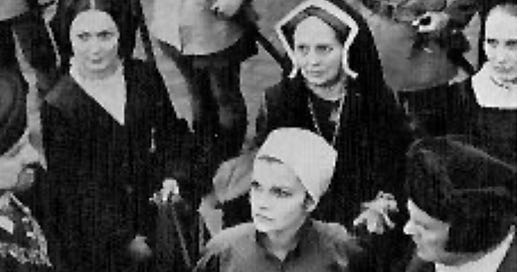Why the “1000 Days’” Tower Speech Rang True in 1969—and Still Does Today
It was an honor to interview Genevieve Bujold for my book on Anne Boleyn. The following is an excerpt based on that interview—and that iconic scene!! If you know a Boleyn fan, please do share!
….Genevieve Bujold’s performance, and a few key changes in the play, were to make quite a dramatic transformation in the Maxwell Anderson original. Anderson’s play, despite it’s fireball Anne, was really Henry’s story, and, like Hackett’s biography, was intent on exorcising the ghost of Bluff King Hal, described in Hacket’s biography as “the sort of man who cuts off his wife’s heads, ha-ha, out of a big, jovial, exuberant good humor. Off with her head! Off with the next one’s head! The more, the merrier.” (248) Charles Laughton, in Private Life, played precisely this kind of Henry, and with such gusto and ingenuity that many viewers (and reviewers) believed that they were seeing the “real” Henry.
Hacket and Anderson, however, considered this kind of portrait to be a caricature. Their respective Henrys are not piggy old souls, but tortured monarchs. Anderson’s Henry, in particular, is a tragic figure. He truly loves Anne, but gets caught in the net of his own obsession with an heir, masculine pride, and self-indulgence. Ultimately, he comes to see that he has paid an enormous price, but that “nothing can ever be put back the way it was.” In the final speech of the play, Henry muses on the magnitude of what has changed for his country (“the limb that was cut from Rome won’t graft to that trunk again”) and, with Anne’s ghost hovering in the background, begins to realize that “all other women will be shadows” and that he will seek Anne “forever down the long corridors of air, finding them empty, hearing only echoes.” “It would have been easier,” he now recognizes, “to forget you living than to forget you dead.”

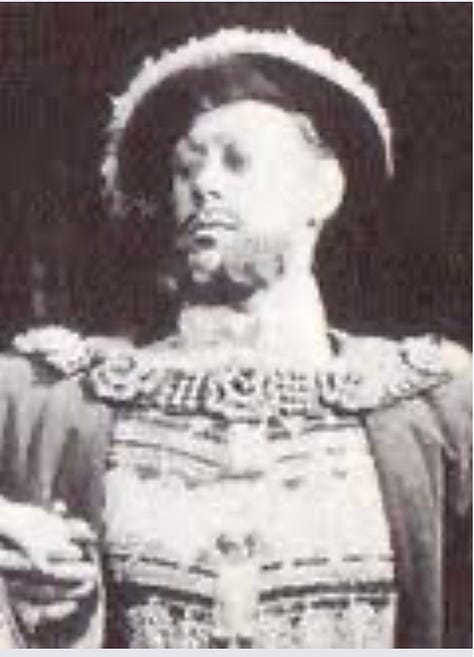
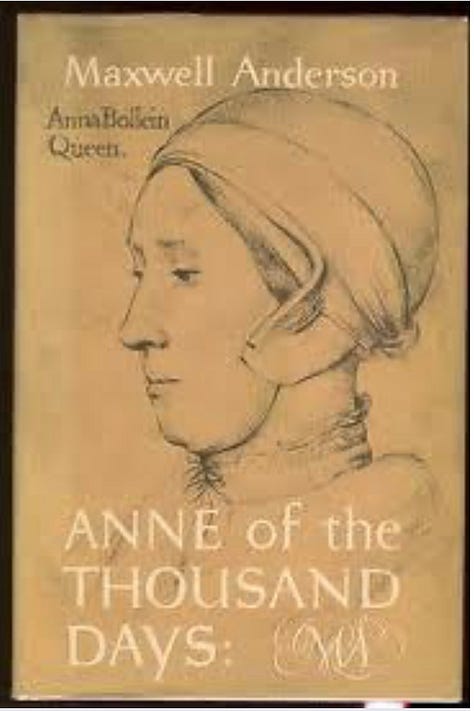
In Anderson’s play, it’s Henry, then, who has the final word, who makes the final pronouncements about history, whose torments we are left to imagine.
The film, however, ends very differently. The screenplay, adapted from the play by Brigid Boland, John Hale, and Richard Sokolove, has Henry, in our last glimpse of him, listening for the signal sounding Anne’s death, then galloping off to see Jane Seymour with nary a second thought. In place of his sober, sad reflections at the end of the play, in the film we see little Elizabeth, a sprig of flowers in her hand, toddling down the path towards greatness (actually in the gardens of Penshurst Castle) while her mother’s voice in the background predicts her daughter’s glorious future. The voice-over is a repeat of part of an earlier speech, one that has viewers cheering for Anne to this day. As in the play, Henry visits Anne in the Tower, and as in the play, she lies to him about her fidelity to him. In the movie, however, she embellishes her lie with more detail, and pierces his manhood with even sharper arrows:
Yes, it’s overblown. And it’s utterly without historical foundation. Henry never visited Anne in her room in the Tower, and Anne never delivered a speech like this; indeed, at this point, Anne knew the chances of Elizabeth ever becoming queen were extremely slim. Two days before her execution, her marriage to Henry was declared null and void by Henry’s lawyers, and Elizabeth bastardized. In the movie, she is given a choice that the real Anne never had: to live, if she will willingly end the marriage, freeing Henry to marry Jane Seymour and making Elizabeth illegitimate in the bargain. Or to die, with Elizabeth still a rightful heir. She turns Henry down flat.
It was all invention, but of a particularly potent and timely sort for 1969. This was a period of convention-smashing in film: Bonnie and Clyde, The Graduate, In the Heat of the Night, Midnight Cowboy, The Wild Bunch, Butch Cassidy, and Easy Rider. But with the exception of Bonnie Parker and Mrs. Robinson (but strikingly not her daughter Elaine), the female characters in the New American Cinema played by the rules. It was the men who challenged the “status quo,” and the men who paid heroically for it. 1Hale and Boland’s Anne, long before Thelma and Louise, is the first female heroine to ride off the cliff, in full consciousness of what she is doing, to preserve her own integrity (and in this case, the future of her daughter and of England).
It struck a chord, even with me. In 1969, I was a pretty cynical movie-goer. The anti-sentimentalist Pauline Kael, who did movie reviews for The New Yorker, was my idol, and I hated anything that smacked of pretention or high-mindedness. I was not a feminist in anything but the most inchoate sense of the word. While friends of mine were joining consciousness-raising groups and attending demonstrations, I scorned and was made anxious by what I thought of as “groupthink.” My own personal rebellion was to drop out of school, have a lot of mindless sex, marry someone I didn’t love, and then suffer a nervous breakdown which made me unable to leave him.
But I did manage to make it to the movies—and Anne of the Thousand Days was one of them. It was my first introduction, since the boring, sexless Tudor history I’d read in high school, to the story of Henry and Anne. I had no idea what was invented and what was historically documented, but it made no difference. I loved fiery, rebellious Anne. I loved the way she bossed Richard Burton’s Henry around like a surly, 20th-century teenager. I loved the fact that Genevieve Bujold’s hair was messy as she delivered that speech to Henry, loved her intensity, loved her less-than-perfectly symmetrical beauty, loved the fact that someone that small could pack such a wallop.
Anne’s speech in the Tower might have seemed melodramatic if it had been played by a young Bette Davis—or, heaven forfend, an Elizabeth Taylor! But Bujold’s fire, issuing from her petite frame and elfin face, her hair disheveled, her dark eyes glittering with pride, desperation, hurt, and vengeance, transformed the potentially hokey into an indelible, iconic moment. Even at a recent festival of Burton’s films, held by the British Film Institute, the audience was stirred, crying out “Go, Anne, go, you tell him!”
“After watching this,” writes one contemporary Tudorphile, “you come away with the feeling that if that ain’t the way it really happened then it should’ve. I love the pride she displays even after Henry slaps her. She’s right, he’s wrong and they both know it. As she goes on talking down to him you can see him shriveling little by little and he nevermore was the man he’d once been. Seems she got the last laugh in more ways than one.”
Bujold also did something with Anne’s famous—and famously ambiguous—comments in the Tower that no other actress before or since has done, and that contributed to the believability of that final speech. Anne’s behavior in the Tower, as she awaited her sentencing and then her death, provides some of the most intriguing clues to her personality. Unfortunately, it was recorded by Constable Kingston, a man who seems to have been tone-deaf to her sense of irony. When Anne delivered her best-known line—“I heard say the executioner was very good, and I have a little neck”—then put her hands around her neck and “laughed heartily” (as Kingston described it), he took her to be showing “much joy and pleasure in death.” The actresses who have played Anne have been too smart to accept that interpretation, but then have been left with the task of figuring out just what was going on.
Merle Oberon and Dorothy Tutin, who played Anne in the 1971 BBC series The Six Wives of Henry VIII, eliminate the laughter entirely, and have Anne say the line wistfully, as if in resigned acceptance (and in the case of Oberon, with a touch of narcissism) over the reality of the coming confrontation between steel and flesh. Natalie Dormer, who played Anne in Showtime’s The Tudors, plays the “little neck” speech as a moment when the unimaginable stress that Anne is enduring breaks through her composure, and both the absurdity and the terror of her situation erupt in a crazy joke and then, hysterical laughter—an interpretation that fits well with the evidence that Anne’s behavior in the tower was frequently unhinged. But Bujold chooses to emphasize Anne’s intelligence and pride rather than her emotional instability, and plays the line as a sardonic response to Kingston’s lame reasurrances that the blow would be so “subtle” there would be no pain. Her Anne recognizes cowardly, self-serving bull when it’s thrown at her, and will have none of it. Her Anne was, and probably always will be, the proudest of the Annes.
…..Bujold’s own history had prepared her well to play a young woman breaking through the confinements of convention. She had grown up in a devout French-Canadian Catholic household, and spent her first twelve school years in a convent; in an online biography, she is quoted as saying that at the time she felt “as if I were in a long, dark tunnel, trying to convince myself that if I could ever get out, there was light ahead.” But something about her religious training made its way into her attitude toward acting. When asked in 2007 how she prepared for her roles, she answered, “You pray for grace. If you’ve done your homework and, most of all, are open to receive, you go forward…Preparation for me is sacred.” But going forward with her own life required rebellion as well as grace; she finally “got out’ of the tunnel by being caught reading a forbidden book. Liberated to pursue her own designs for her life, she enrolled in Montreal’s free Conservatoire d’Art Dramatique.” While on tour in Paris with the company, she was discovered by director Alain Resnais, who cast her with Yves Montand in the acclaimed La Guerre est Finie.
Resnais taught her an acting lesson that “still is in me, will always be with me. ‘Always go to the end of your movement,’ he told me”–don’t short-circuit the emotion, the bodily expression, the commitments of the personality you are playing, allow them to fully unfold. That’s something that Genevieve saw in Anne as well. “You can’t put something into a character,” she said, “that you haven’t got within you. Every little thing in life is fed into the character…A word, a thought. I had read something on Anne Boleyn that Hal gave me and I could look at her with joy and energy; Anne brought a smile to my face.” I asked her what elicited that smile. “Independence. A healthy sense of justice. And she knew herself and was well with herself. She obviously had such profound integrity in that respect. She was willing to lose her head to go to the end of her movement.” That’s what we see, too, in her portrayal of Anne, especially in that final speech, and it’s why “My Elizabeth shall be queen!” still has audiences cheering for her, unconcerned with the historical liberties.
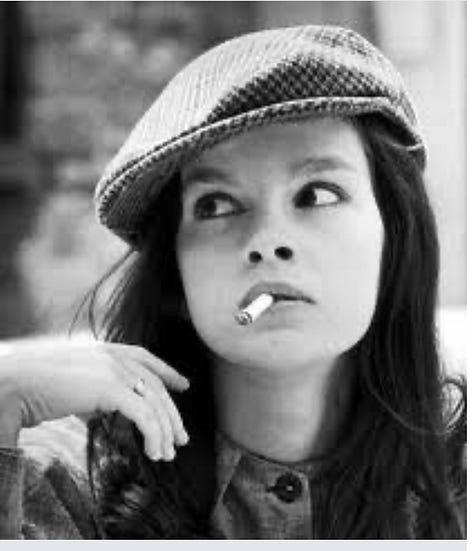
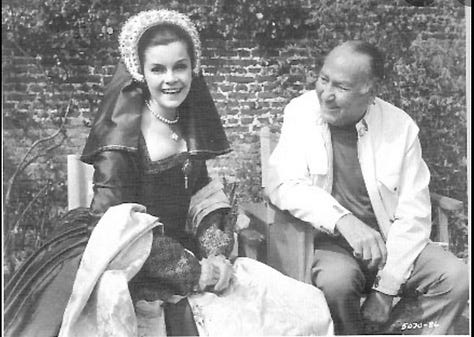
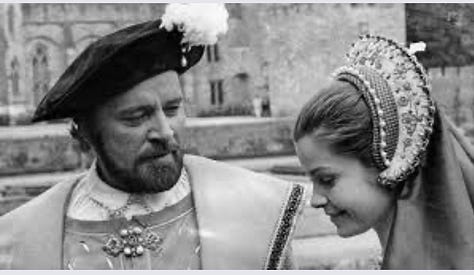
Most movies of the late nine-sixties have not worn exceptionally well, particularly with today’s generation of viewers, for whom many of the lifestyle protests of the times seem dated and silly. My students snoozed through Easy Rider. With Anne of the Thousand Days, the passing years and changing culture have had the opposite effect; my students adored it, and especially an Anne that seems to become “truer” as the generations have become less patient with passive heroines and perhaps a bit tired by the cutesy, man-focused femininity of many current female stars.: “Everything I imagine Anne really was”; “How I always picture Anne—as a strong woman not a sniveling girl”; “The gold standard of Annes”; “When I imagine Anne, it is her that I see”; “One of the best Annes ever — all fire and grace.” “The definitive Anne Boleyn for me”; “Pitch-perfect”; “So powerful that she turned a big, tough guy like myself into a wimpering fool.”
Before I said good-by to Genevieve in our interview, I asked her who she would pick to play Anne today. She admitted that she hadn’t seen either Natalie Portman or Natalie Dormer; she lives a fairly reclusive life in Malibu, and rarely sees movies or watches television. “But is there anyone who you think would do the part justice?” She was silent for awhile, then asked me if she could be honest. Of course, I said. “Maybe it’s selfish, but…the way I feel….” Genevieve had been so warm and generous throughout the interview, praising all her mentors and influences in her life, she was clearly a bit uncomfortable with what she wanted to say. So, I pressed a bit more, and she responded, with an intensity that recalled her performance and made me smile with delight.
“No-one,” she replied, “Anne is mine.”
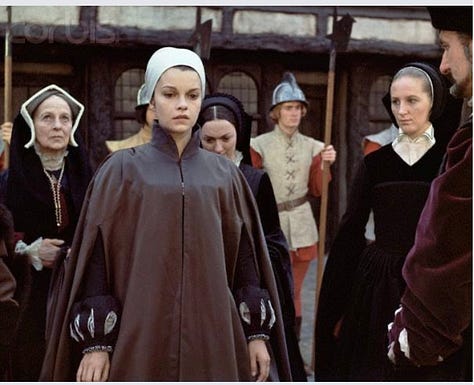
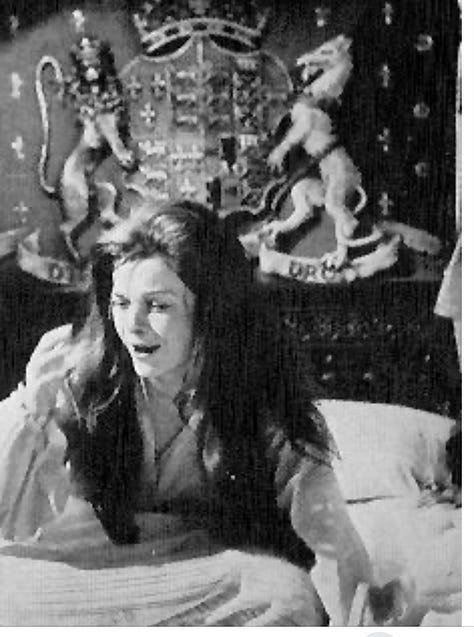
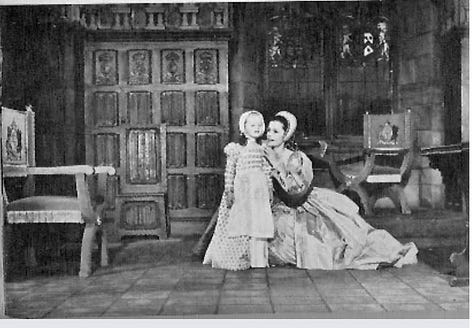
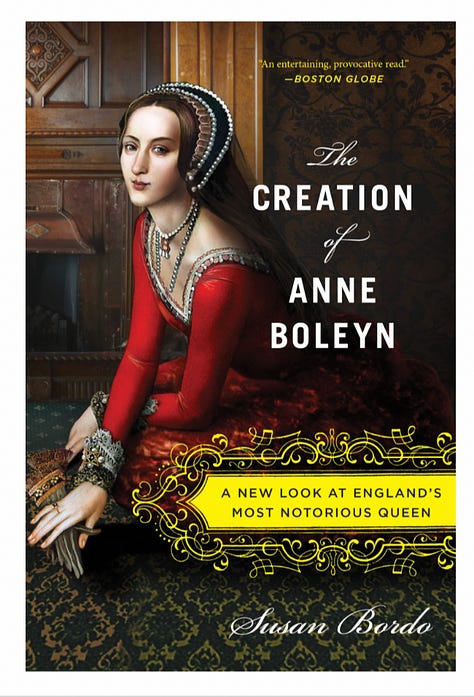
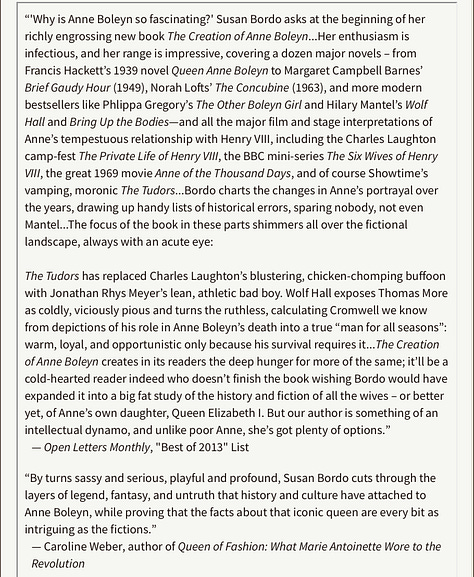

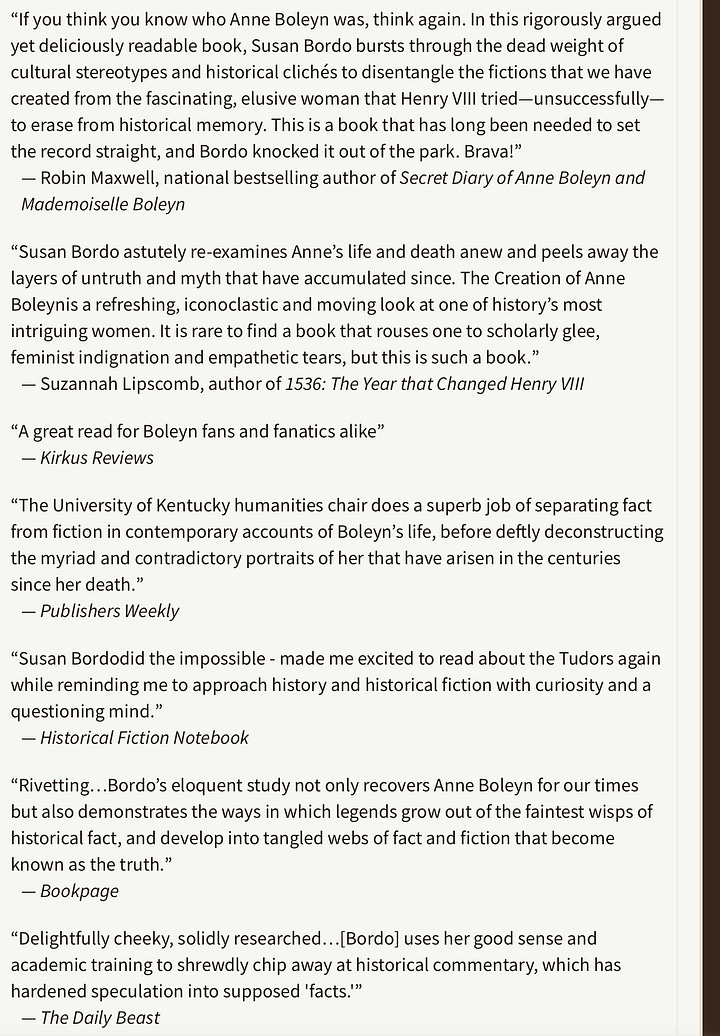
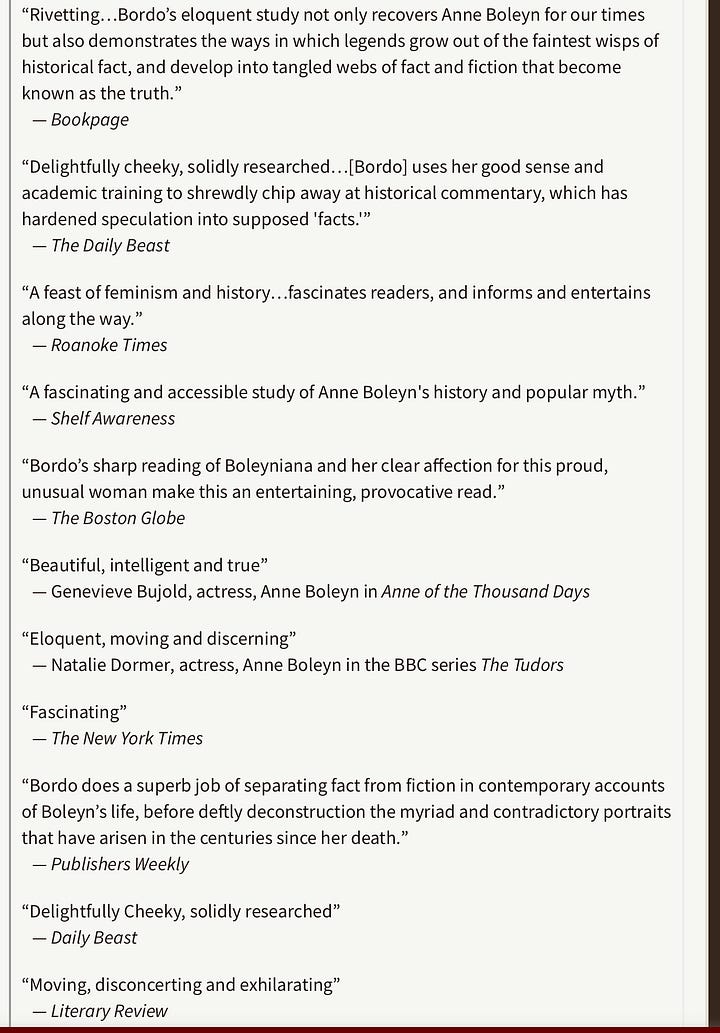
Although nowadays, pop culture tends to call the shots on “reality,” it used to be that it took awhile for movies to catch up with events in the real world. In 1969, Women’s Liberation groups were forming all over the country. But it would be another five years or so before films like Scorcese’s Alice Doesn’t Live Her Anymore and Mazursky’s An Unmarried Woman would bow, gently, in the direction of a “new woman.” It wouldn’t be until Thelma and Louise (1991) that the deepest gender conventions would be challenged. In Alice and Unmarried Woman, the heroines’ (Ellen Burstyn and Jill Clayburgh) independence is tempered by the presence of two gorgeous, really nice guys (Kris Kristofferson and Alan Bates, each at the height of his appeal) who, it is implied, will remain in the women’s lives, providing support and great sex while the heroines pursue their careers. In Thelma and Louise, in contrast, even the nicest of the male characters are impotent; despite every attempt, they cannot alter the tragic course of events. The women have chosen, and they—like the rebel-males of the 1968-9 films—will have to pay the price.

